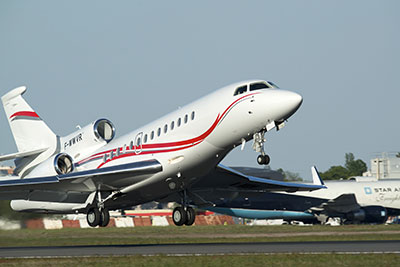
Features
Operations
Legal Matters: Eliminating the guesswork
People ordinarily do not give much thought to what would happen if they defaulted on their payments on a lease or loan but they generally understand that if they don’t pay, the property may be repossessed.
September 6, 2013 By Krista Bulmer
People ordinarily do not give much thought to what would happen if they defaulted on their payments on a lease or loan but they generally understand that if they don’t pay, the property may be repossessed. However, the analysis does not go much beyond that for most of us and the mechanics behind a creditor’s rights remain a mystery.
 |
|
| The Cape Town Convention is intended to eliminate the confusion and uncertainty arising from different rules and laws in multiple jurisdictions. PHOTO: DASSAULT FALCON |
In Canada, a creditor will take what is known as a “security interest” in a piece of equipment when it is sold on credit or when it is leased. This is done through contract, so when you buy a car, for instance, you are required to sign an agreement granting the creditor a security interest in the car. The creditor can then register its security interest in a provincial registry so that if you fail to make your payments, the creditor can follow the applicable rules in order to seize the vehicle and try to sell it to recover its losses.
There is a complex set of laws and rules in each province that govern how and when the creditor may enforce its security interest in your car. The same is true of security interests in aviation transactions.
What is certain is that the greater the risk there is to a creditor, the higher the cost to the borrower. This risk is often reflected in the interest rate charged or additional fees. If you are a high-risk borrower, you may need to get your credit from a private lender that charges a high interest rate.
So in aviation transactions, the cost associated with increased risk can be enormous when you are dealing with high-value assets such as aircraft. Enforcement measures, such as repossession of aircraft, add an additional layer to the anticipated risk since commercial and business aircraft are almost always on the move and may be in multiple jurisdictions over the course of a single day, let alone a week or a month. These costs are usually reflected in the “exposure fees” charged to airlines and operators by export credit agencies.
In 2001, an international treaty resolution was passed proposing the (inelegantly named) “Convention on International Interests in Mobile Equipment” and the “Protocol to the Convention on International Interests in Mobile Equipment on Matters Specific to Aircraft Equipment,” collectively known as the Cape Town Convention. Because it required other legislation and statutes to be amended prior to the Cape Town Convention coming into force, Canada was slow to ratify the Convention but finally did on April 1, 2013.
Until the Cape Town Convention came into force, the same set of laws that applied to the purchase of a photocopier or a car also governed a creditor’s rights in Canada with respect to its security interest in an aircraft, aircraft engine or helicopter. So, while a lender may have some form of protections in place in Canada, it often had to make multiple registrations in multiple provinces and there was uncertainty about the enforcement of its interests when the aircraft was in another jurisdiction.
The Cape Town Convention is intended to eliminate the confusion and uncertainty arising from different rules and laws in multiple jurisdictions and create a uniform set of rules for the lease and sale of “aircraft objects,” which includes fixed-wing aircraft that can carry at least eight persons, aircraft engines with at least 1,750 pounds of thrust and helicopters that carry five or more passengers.
For a transitional period, Canadians who have leased or financed aircraft may see some overlap in creditor registrations, meaning that creditors will likely register their security interests in both provincial registries as well as the international registry located in Dublin, Ireland. This situation will most likely occur where a pre-existing security agreement permitted the creditor to register its interest under Cape Town once the Convention came into force, creating an additional layer of security for the creditor during the transition period.
The implementation of the Cape Town Convention in Canada should help to make cross-border financing arrangements more attractive by significantly reducing the risk to creditors, improving enforceability and reducing the cost to the borrower. This means that we should see expanded financing opportunities for operators in Canada at a reduced cost. If the purchaser is based in a country that has ratified the Cape Town Convention, exposure fees from export credit agencies are reduced by up to 10 per cent. That could mean substantial savings on the purchase of a business jet or commercial aircraft. It is a win-win for creditors and borrowers alike.
Krista Bulmer is a lawyer practising aviation law, business law and civil litigation with the law firm, Wires Jolley LLP in Toronto